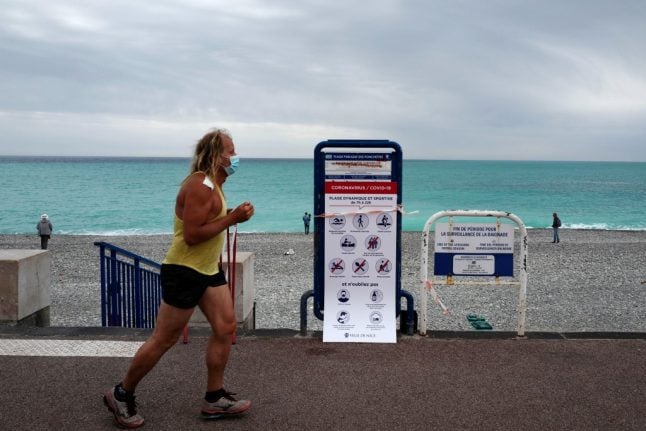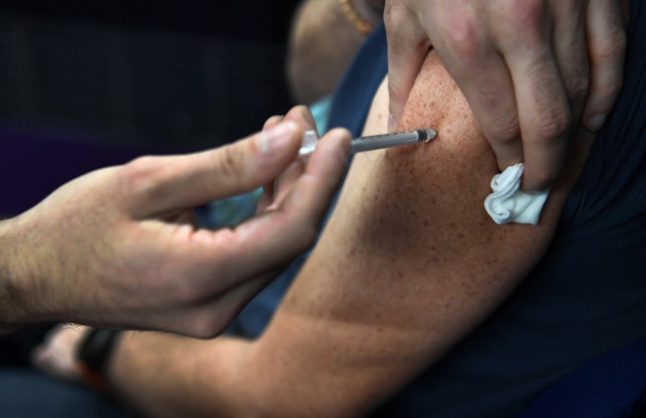Since France first began a slow and gradual lifting of lockdown mid-May the government has relaxed most of the strict health rules in place.
But a number of rules and guidelines remain in place, which can be a source of confusion for those not familiar with them.
Here is a list of things you should know about before taking a trip to France.
1. Bring a mask
Masks are compulsory on all forms of public transport in France (including taxis and Ubers) and in all indoor public spaces.
A full list of where a mask is required can be found here.
If you're caught without a mask on public transport or in an indoor public space you risk a €135 fine.
Business owners or tourists operators can still require visitors to wear a mask in places that do not fall under the government's rules – such as when climbing the Eiffel Tower or visiting Monet's waterlily gardens in Giverny.
You will see signs reading port du masque obligatoire (wearing a mask is compulsory) in such places.
Basic advice when visiting France is therefore to always keep a mask at hand in case you need it. You can easily purchase single-use masks in regular stores or pharmacies. A lot of independent shops sell multiple-use cloth ones for a cheap price.

Waiters in France have to wear a mask at all times, but customers can remove them when seated. Photo: AFP
2. .. but don't throw your mask on the ground
Throwing your mask on the ground instead of in the bin is a punishable offence for which you risk a €68 fine. The government has said it intends to increase the fine to €135, perhaps even €750, due to the potential health dangers.
4. Keep a 1 metre distance
The advice for social distancing and hygiene measures in France remains unchanged as of June 22nd and people are asked to follow basic health advice.This includes not getting closer than 1 metre to other people, washing their hands frequently, using hand gel and coughing into their elbows.
5. No crowding on public transport
In addition to wearing a mask, some public transport operators are asking travellers to space out to respect the 1 metre distancing rule. On the Paris Metro you will see bumper stickers asking passengers to only use every other seat in order to avoid crowding.
When national rail company SNCF resumed its services it first only filled up half of the total number of seats per train, but it quickly changed its policy and is now putting out all tickets for sale. Passengers must wear a mask at all times while on the train.
The onboard cafés remain closed for the time being, but on the bright side the cleaning routines have massively been stepped up and the toilets are much nicer than they were before the pandemic.
From masks to spas: Crossing the French-Swiss border in the Covid era
6. Beaches more relaxed than before
Since June people have free access to France's beaches. For a brief period the rule was “dynamic” access where people could use the beaches (walk, run and swim), but not lay down.
Now, the only rules in place are those imposed by local authorities (so watch out for signs spelling out any health rules) and the general rule of keeping 1 metre distance. Other than that you may use the beach as you please.
7. No cars (in some streets)
If you're in Paris, watch out for changes to the traffic rules as local authorities have declared many streets off-limits to cars. Some of them have been closed to allow café terraces to expand while others – like the Rue de Rivoli – have been turned into bike lanes to encourage more people to take up cycling and stay off the crowded public transport.
8. No big gatherings
After a lonely couple of months, meeting friends and family is now allowed again, as are some nights out, but with limits.
Gatherings of more than 5,000 people are still banned and this rule is unlikely to be relaxed until mid August at the earliest.
People who fall into vulnerable groups such as the over 65s are still advised – although not ordered – to self-isolate.
9. No football or rugby matches or concerts
Mass gatherings of more than 5,000 people are still banned, which means no concerts at bigger music venues. Sports stadiums will be allowed to reopen with crowds from July 11th, but the 5,000 person maximum limit will still apply.
The French rugby and football leagues have both declared the 2019/20 season over and plan to restart the new season in September.
For amateurs, contact sports such as football and rugby are still banned although non-contact team sports are now allowed
10. Hand gel
Gel is available in dispensers on the streets in cities and at the entrance to many shops, businesses and tourist attractions. Business owners and the operators of tourist attractions can require people to use hand gel before entering.
11. No kissing
The double (or sometimes treble) cheek kiss known as la bise is a key part of French culture, but the government has now told people not to do it as it risks spreading infection, with handshakes similarly banned.
READ ALSO Sex, dating and coronavirus – what is the advice in France?



 Please whitelist us to continue reading.
Please whitelist us to continue reading.
Member comments